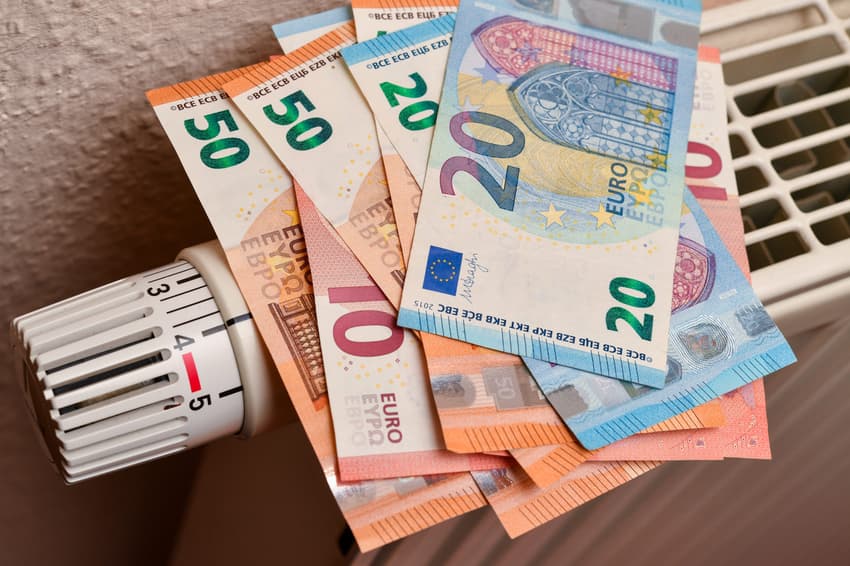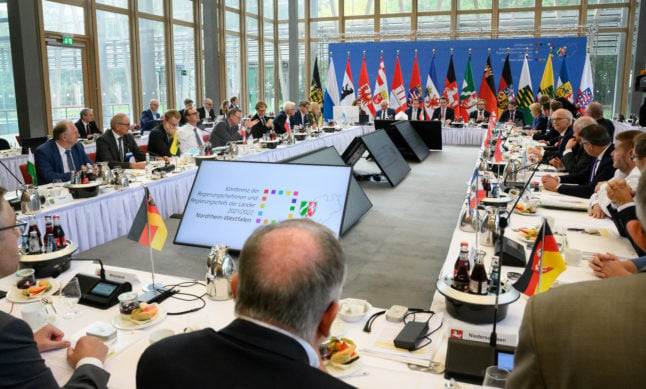Germany to thrash out details of €200 billion energy support package

Chancellor Olaf Scholz is meeting with Germany’s 16 state leaders on Tuesday to work out the details of the country’s energy relief packages and a cap on the price of gas. But a few questions remain open.
What’s happening?
With power bills more than doubling in some cases, German federal and state leaders have decided more support is needed. Chancellor Scholz last week announced a €200 billion package to cushion the blow for people in Germany yet further.
One of the most expensive planned measures is a Gaspreisdeckel - or a cap on the price of gas households would pay this winter.
That comes on top of a combined €100 billion in relief spending over three spending packages already passed in the Bundestag. The last one, amounting to €65 billion, was passed only about a month ago.
Those packages are paying or have paid everything from the popular €9 nationwide public transport ticket, a VAT cut on gas bills, to one-off energy and cost of living relief payments.
But that wasn't enough for many state leaders, who began calling for a gas price cap.
READ ALSO: KEY POINTS: Everything Germany is doing to help relieve rising energy costs
These calls also come from across the German political spectrum.
Both Markus Söder, the Bavarian premier from the conservative Christian Social Union (CSU) and Berlin mayor Franziska Giffey of the Social Democrats, have been particularly vocal in their support for a gas price cap.
Is a gas price cap coming?
Households in Germany are very likely to see a cap on their gas bills of some sort this winter.
What’s not clear yet - and what federal and state leaders are hammering out Tuesday - is how precisely it will work in practice, when it might come in, how long it will last, and how it’ll be paid for.
The SPD-led government of Mecklenburg-West Pomerania and national Green co-leader Ricarda Lang want a gas price cap that would cover 80 percent of what households use.

German state leaders attend a conference. Photo: picture alliance/dpa | Bernd von Jutrczenka
Under a plan like that, 80 percent would be termed a “basic consumption” requirement and capped in price for the average consumer. The other 20 percent would float according to the market rate for gas - to help encourage people to still save energy.
Söder’s Bavarian CSU has previously advocated for a 75/25 percent split between the capped portion and the floating portion to encourage more energy saving.
The government is then on the hook to pay the rest.
READ ALSO: Why did Germany make a U-turn on gas levy - and what do the new plans mean?
The cap is likely to last for the winter months at least, although this depends on Tuesday’s government talks, which also cover the thorny issue of how the government intends to pay for the cap.
The German Institute for Economic Research’s Marcel Fratzscher told broadcaster RTL and ntv last week that a cap alone could cost anywhere between €30 and €50 billion.
The Scholz government wants to pay for this primarily by running up government debt, something Finance Minister Christian Lindner has reservations about, as it would mean suspending Germany’s constitutional debt brake.
The federal state governments would be expected to pay for at least some of it, and any disputes Tuesday could hamper an agreement—potentially delaying the start of any cap or further relief measures.
A €9 ticket successor and relief for small businesses. What else do Germany’s states want?
Germany’s 16 federal state leaders are also bringing in a list of other measures they want to see from Scholz’s promised €200 billion in relief spending.
Chief among these is the unresolved question of how to pay for the planned successor to Germany’s popular €9 nationwide public transport ticket this summer.
Politicians are floating the idea of a more expensive €49 ticket, although the price could reach above €60, depending on how much money federal states are willing to kick in for it along with the federal government.
READ ALSO: Germany to set out plans for €49 transport ticket in October
North-Rhine Westphalia premier Hendrik Wüst is also calling for the federal government to make more money available for refugee housing, particularly as around 1 million Ukrainian refugees have arrived in Germany since the Russian invasion began in February.
Comments
See Also
What’s happening?
With power bills more than doubling in some cases, German federal and state leaders have decided more support is needed. Chancellor Scholz last week announced a €200 billion package to cushion the blow for people in Germany yet further.
One of the most expensive planned measures is a Gaspreisdeckel - or a cap on the price of gas households would pay this winter.
That comes on top of a combined €100 billion in relief spending over three spending packages already passed in the Bundestag. The last one, amounting to €65 billion, was passed only about a month ago.
Those packages are paying or have paid everything from the popular €9 nationwide public transport ticket, a VAT cut on gas bills, to one-off energy and cost of living relief payments.
But that wasn't enough for many state leaders, who began calling for a gas price cap.
READ ALSO: KEY POINTS: Everything Germany is doing to help relieve rising energy costs
These calls also come from across the German political spectrum.
Both Markus Söder, the Bavarian premier from the conservative Christian Social Union (CSU) and Berlin mayor Franziska Giffey of the Social Democrats, have been particularly vocal in their support for a gas price cap.
Is a gas price cap coming?
Households in Germany are very likely to see a cap on their gas bills of some sort this winter.
What’s not clear yet - and what federal and state leaders are hammering out Tuesday - is how precisely it will work in practice, when it might come in, how long it will last, and how it’ll be paid for.
The SPD-led government of Mecklenburg-West Pomerania and national Green co-leader Ricarda Lang want a gas price cap that would cover 80 percent of what households use.

Under a plan like that, 80 percent would be termed a “basic consumption” requirement and capped in price for the average consumer. The other 20 percent would float according to the market rate for gas - to help encourage people to still save energy.
Söder’s Bavarian CSU has previously advocated for a 75/25 percent split between the capped portion and the floating portion to encourage more energy saving.
The government is then on the hook to pay the rest.
READ ALSO: Why did Germany make a U-turn on gas levy - and what do the new plans mean?
The cap is likely to last for the winter months at least, although this depends on Tuesday’s government talks, which also cover the thorny issue of how the government intends to pay for the cap.
The German Institute for Economic Research’s Marcel Fratzscher told broadcaster RTL and ntv last week that a cap alone could cost anywhere between €30 and €50 billion.
The Scholz government wants to pay for this primarily by running up government debt, something Finance Minister Christian Lindner has reservations about, as it would mean suspending Germany’s constitutional debt brake.
The federal state governments would be expected to pay for at least some of it, and any disputes Tuesday could hamper an agreement—potentially delaying the start of any cap or further relief measures.
A €9 ticket successor and relief for small businesses. What else do Germany’s states want?
Germany’s 16 federal state leaders are also bringing in a list of other measures they want to see from Scholz’s promised €200 billion in relief spending.
Chief among these is the unresolved question of how to pay for the planned successor to Germany’s popular €9 nationwide public transport ticket this summer.
Politicians are floating the idea of a more expensive €49 ticket, although the price could reach above €60, depending on how much money federal states are willing to kick in for it along with the federal government.
READ ALSO: Germany to set out plans for €49 transport ticket in October
North-Rhine Westphalia premier Hendrik Wüst is also calling for the federal government to make more money available for refugee housing, particularly as around 1 million Ukrainian refugees have arrived in Germany since the Russian invasion began in February.
Join the conversation in our comments section below. Share your own views and experience and if you have a question or suggestion for our journalists then email us at [email protected].
Please keep comments civil, constructive and on topic – and make sure to read our terms of use before getting involved.
Please log in here to leave a comment.